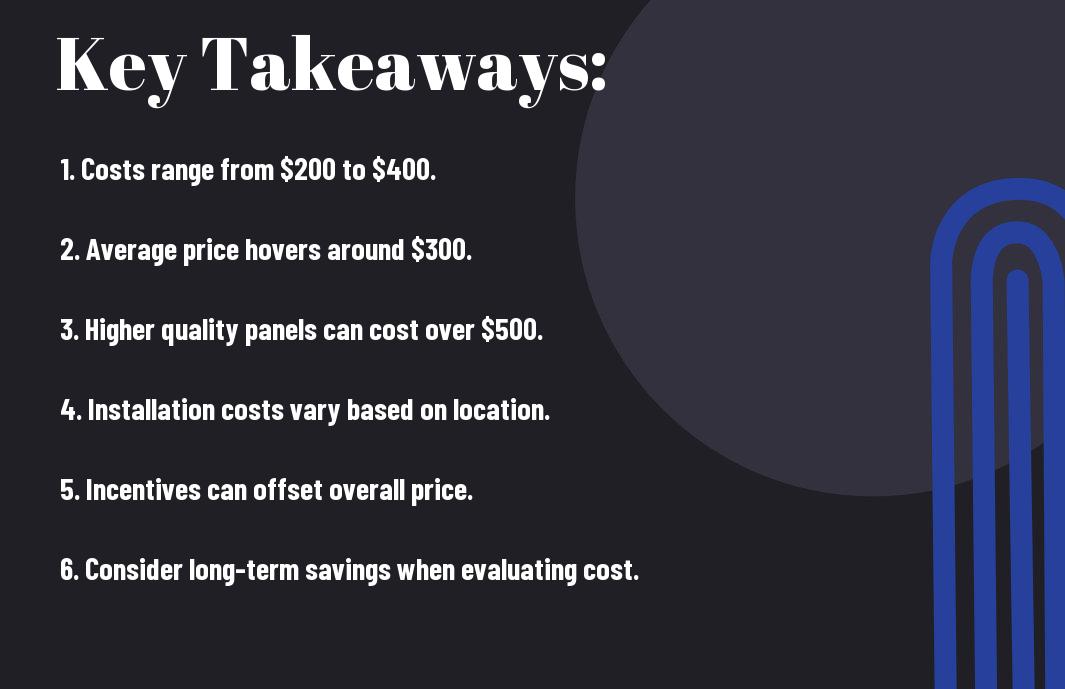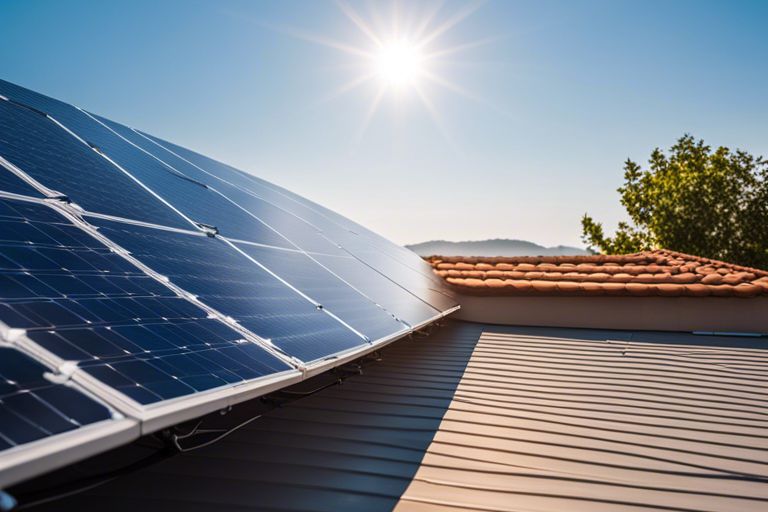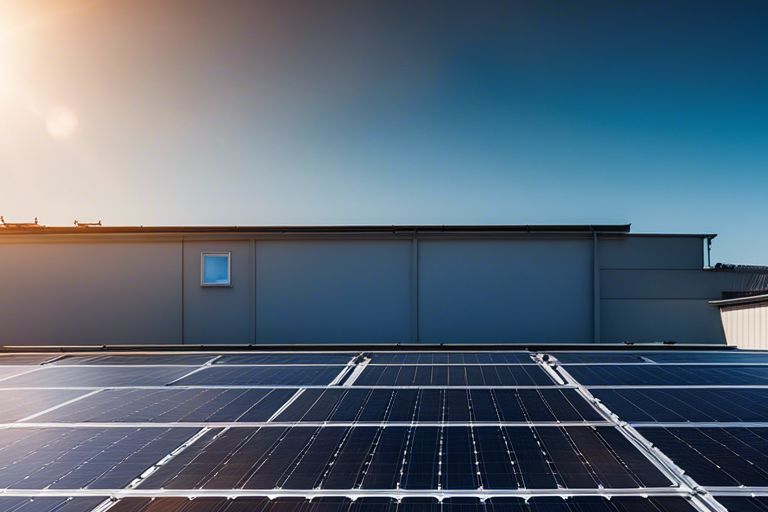Many of you may wonder about the cost of a full-sized solar panel. Investing in solar energy for your home is not only environmentally friendly but also financially beneficial in the long run. The price of a full-sized solar panel can vary depending on factors such as the brand, efficiency, and installation costs. On average, you can expect to pay between $15,000 to $25,000 for a full-sized solar panel system. However, remember that government incentives and rebates can help offset some of the costs, making solar energy a more affordable option for your home.

Key Takeaways:
- Cost varies: The cost of a full-sized solar panel can vary depending on factors such as size, efficiency, brand, and technology.
- Average price: On average, a full-sized solar panel can cost anywhere from $150 to $400 per panel, with higher-end panels costing even more.
- Long-term savings: While the upfront cost of solar panels may be high, they can lead to significant long-term savings on energy bills and may even qualify for tax incentives or rebates.

What is a Full-Sized Solar Panel?
While exploring the topic of solar panels and their costs, you may wonder, “How Much Do Solar Panels Cost in 2024?” You can find detailed information on this at How Much Do Solar Panels Cost in 2024?. Solar panels are rapidly gaining popularity as a renewable energy source. These panels are designed to absorb sunlight and convert it into electricity that can be used to power homes or businesses.
Definition and Characteristics
One of the key characteristics of a full-sized solar panel is its efficiency in converting sunlight into energy. These panels are typically composed of silicon cells that create an electric field when exposed to sunlight. The size of a full-sized solar panel can vary, but they are generally large enough to generate a significant amount of electricity for residential or commercial use.
Types of Full-Sized Solar Panels
Panel technology has evolved over the years, leading to the development of various types of full-sized solar panels. Some common types include monocrystalline, polycrystalline, thin-film, and bifacial panels. Each type has its advantages and disadvantages in terms of efficiency, cost, and durability. Perceiving these differences can help you choose the best option for your specific needs.
It is imperative to consider your location, budget, and energy requirements when selecting a full-sized solar panel for your property. Each type of panel offers unique features that can impact its performance and longevity. By understanding the characteristics of different solar panels, you can make an informed decision that aligns with your energy goals.
| Panel Type | Key Features |
|---|---|
| Monocrystalline | High efficiency, sleek appearance |
| Polycrystalline | Cost-effective, lower efficiency |
| Thin-film | Lightweight, flexible design |
| Bifacial | Double-sided energy production |
| PERC | Enhanced efficiency, high power output |
This breakdown allows you to compare the different types of full-sized solar panels and their unique characteristics. By selecting the right panel for your specific requirements, you can maximize the benefits of solar energy for your property.
- Consider factors such as efficiency, cost, and durability when choosing a full-sized solar panel.
- Consult with a solar energy expert to determine the best panel type for your location and energy needs.

Factors Affecting the Cost of a Full-Sized Solar Panel
Any number of factors can influence the price you pay for a full-sized solar panel. Here are some key considerations that can impact the cost:
Material Quality and Efficiency
Full-sized solar panels come in various qualities and efficiencies. The better the quality and efficiency of the materials used, the higher the cost of the panel. High-quality materials can ensure better performance and durability over time, leading to higher upfront costs but potentially saving you money in the long run due to increased energy production and decreased maintenance needs. Recognizing the importance of material quality and efficiency can help you make an informed decision when choosing a solar panel for your needs.
Brand and Manufacturer
For some, the brand and manufacturer of a solar panel can significantly affect its cost. Some well-known brands may charge a premium for their reputation and reliability, while lesser-known manufacturers might offer more budget-friendly options. When considering the brand and manufacturer of a solar panel, it’s important to weigh the price against factors like warranty, customer service, and overall quality. Plus, doing your research and reading reviews can help you determine if paying a premium for a certain brand is worth it for you.
Size and Wattage
Affecting the cost of a full-sized solar panel is its size and wattage. Larger panels with higher wattage capacities typically come with a higher price tag due to their increased energy output potential. However, the size and wattage of a solar panel should be chosen based on your specific energy needs and available roof space. Brand can also play a role in determining the cost of larger, higher wattage panels.
Average Cost of a Full-Sized Solar Panel
Residential Solar Panels
Unlike commercial solar panels, residential solar panels are typically smaller in size and capacity. On average, a full-sized residential solar panel can cost you around $15,000 to $25,000, depending on the brand, quality, and efficiency. This cost includes not only the panel itself but also the installation, wiring, and inverters needed to set up a functioning solar energy system for your home.
Commercial Solar Panels
Solar panels for commercial use are larger and more powerful compared to residential panels. Solar panels for commercial purposes are designed to meet the higher energy demands of businesses, factories, or large-scale operations. Regarding commercial solar panels, the cost can range from $20,000 to $40,000 per panel. However, keep in mind that the long-term savings on energy bills and potential tax incentives can make investing in commercial solar panels a wise financial decision for your business.
Commercial solar panels not only help businesses save money on electricity bills but also contribute to a cleaner environment by reducing carbon emissions. By investing in solar panels for your commercial property, you are not only making a smart financial choice but also committing to a more sustainable future for your business and the planet.
Average Cost of a Full-Sized Solar Panel: When considering the average cost of a full-sized solar panel, it’s imperative to factor in not just the initial investment but also the long-term savings and benefits that come with generating your own clean energy. Whether you opt for residential or commercial solar panels, the upfront cost may seem significant, but over time, you will see a return on your investment through lower energy bills and potentially even revenue from selling excess energy back to the grid.
Breakdown of Costs
Panel Cost per Watt
For a full-sized solar panel, the cost can vary based on the brand, quality, and efficiency of the panel. Generally, solar panels can cost anywhere from $0.50 to $0.80 per watt. So, for a typical 300-watt panel, you can expect to pay around $150 to $240.
Installation Costs
As far as installation, the costs can also fluctuate depending on various factors such as labor charges, permits, and additional equipment needed for the installation. On average, installation costs can range from $2,000 to $5,000 for a full-sized solar panel system.
Installation costs can be further influenced by the complexity of the installation, the location of your home, and any upgrades or modifications required to accommodate the solar panel system.
Inverters and Mounting Hardware
In addition to the panel itself, you’ll need inverters to convert the solar energy into usable electricity and mounting hardware to securely install the panels on your roof or property. Inverter costs typically range from $500 to $1,500, depending on the size and type of inverter needed. Mounting hardware costs can vary based on the complexity of the installation and the size of the system.
These additional components are vital for the proper functioning of your solar panel system and play a crucial role in maximizing the energy efficiency of your setup.
Comparison of Costs Across Different Brands
Many solar panel brands offer a variety of options with different price points. Let’s break down the costs of full-sized solar panels across various brands in the market.
Top-Tier Brands
For Top-Tier Brands:
In general, these brands are known for their high efficiency and reliability. However, this often comes at a premium price. You can expect to pay a higher upfront cost for panels from these reputable companies, but the long-term benefits may outweigh the initial investment.
| Brand | Average Cost per Panel |
| Brand A | $400-500 |
| Brand B | $450-550 |
Mid-Range Brands
One brand to consider in the mid-range category is Brand X, offering a balance between quality and affordability. Their panels are priced slightly lower than the top-tier brands, making them a popular choice for many homeowners looking to go solar without breaking the bank.
Comparison of Costs Across Different Brands:
Mid-Range Brands:
When comparing mid-range brands, you will find that the prices are more competitive, ranging from $300 to $400 per panel. While these brands may not have the same level of reputation as the top-tier brands, they still offer decent quality and performance at a more affordable price point.
Budget-Friendly Brands
To save even more on your solar panel installation, you may consider going for budget-friendly brands. These brands offer basic solar panels at a lower cost, making solar energy more accessible to a wider range of homeowners.
Brands in this category typically range from $200 to $300 per panel. While they may not have the same efficiency or longevity as the top-tier brands, they can still effectively harness solar energy and help you reduce your electricity bills in the long run.
Additional Costs to Consider
Maintenance and Repair
With any investment in solar panels, you need to consider the costs associated with maintenance and repairs. While solar panels are low-maintenance compared to other energy systems, they still require occasional upkeep to ensure optimal performance. This can include cleaning the panels, replacing inverters, or addressing any issues that may arise over time. It’s important to factor in these potential costs when budgeting for your solar panel system.
Monitoring and Tracking Systems
Concerning monitoring and tracking systems for your solar panels, you may need to invest in additional equipment to ensure everything is running smoothly. These systems can help you keep track of your energy production, monitor for any potential issues, and optimize the performance of your solar panel system. While these systems can come with an added cost, they can provide valuable insights that can ultimately save you money in the long run.
Consider investing in monitoring and tracking systems to get the most out of your solar panel system. These tools can help you identify any inefficiencies or problems early on, allowing you to address them quickly and effectively. By staying on top of your system’s performance, you can maximize its efficiency and prolong its lifespan.
Battery Storage Systems
Tracking your energy usage and production is important for optimizing your solar panel system. Battery storage systems allow you to store excess energy generated by your solar panels for use during periods of low sunlight or high energy demand. While these systems can be an additional upfront cost, they can provide increased energy independence and resilience in case of power outages.
Consider incorporating a battery storage system into your solar panel setup to maximize your energy savings and self-sufficiency. By storing excess energy for later use, you can reduce your reliance on the grid and potentially lower your energy bills even further. Additionally, battery storage systems can provide peace of mind knowing that you have backup power in case of emergencies.
Summing up
Ultimately, understanding the cost of a full-sized solar panel can vary depending on several factors such as the brand, size, efficiency, and installation costs. It’s important to consider your energy needs, budget, and long-term savings when deciding to invest in solar panels. While the initial cost may seem high, the potential for savings on your energy bills and the environmental benefits make it a worthwhile investment in the long run.
FAQ
Q: How much does a full-sized solar panel cost?
A: The cost of a full-sized solar panel can vary depending on the brand, efficiency, and capacity. On average, you can expect to pay anywhere from $200 to $500 per panel. However, prices can go higher for premium brands or higher efficiency panels.
Q: How much electricity can a full-sized solar panel produce?
A: A standard full-sized solar panel typically has a power output ranging from 250 to 400 watts. This means that under optimal conditions, a single panel can produce around 250-400 watt-hours or 0.25-0.4 kilowatt-hours of electricity per hour.
Q: How long does it take for a full-sized solar panel to pay for itself?
A: The payback period for a full-sized solar panel system can vary depending on factors such as local energy prices, sunlight exposure, installation costs, and incentives. Generally, homeowners can expect a payback period of around 5 to 10 years for their solar panel investment through energy savings and incentives.
